
Peabody & Stearns was a premier architectural firm in the Eastern United States in the late 19th century and early 20th century. Based in Boston, Massachusetts, the firm consisted of Robert Swain Peabody (1845–1917) and John Goddard Stearns Jr. (1843–1917). The firm worked on a variety of designs but is closely associated with shingle style.

The Arlington Street Church is a Unitarian Universalist church across from the Public Garden in Boston, Massachusetts. Because of its geographic prominence and the notable ministers who have served the congregation, the church is considered to be among the most historically important in American Unitarianism and Unitarian Universalism. Completed in 1861, it was designed by Arthur Gilman and Gridley James Fox Bryant to resemble James Gibbs' St. Martin-in-the-Fields in London. The main sanctuary space has 16 large-scale stained-glass windows installed by Tiffany Studios from 1899 to 1930.

The First Unitarian Society of Madison (FUS) is a Unitarian Universalist congregation in Shorewood Hills, Wisconsin. Its meeting house was designed by Frank Lloyd Wright and built by Marshall Erdman in 1949–1951, and has been designated a U.S. National Historic Landmark for its architecture. With over 1,000 members, it is one of the ten largest Unitarian Universalist congregations in the United States.
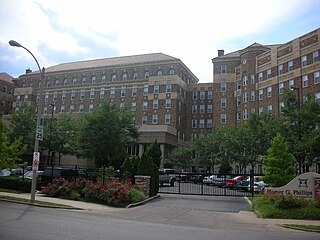
The Ville is a historic African-American neighborhood with many African-American businesses located in North St. Louis, Missouri, U.S.. This neighborhood is a forty-two-square-block bounded by St. Louis Avenue on the north, Martin Luther King Drive on the south, Sarah on the east and Taylor on the west. From 1911 to 1950, The Ville was the center of African American culture within the city of St. Louis.

Lafayette Square is a neighborhood in St. Louis, Missouri, which is bounded on the north by Chouteau Avenue, on the south by Interstate 44, on the east by Truman Parkway, and on the west by South Jefferson Avenue. It surrounds Lafayette Park, which is the city's oldest public park — created by local ordinance in 1836.

This is a list of the National Register of Historic Places listings in St. Louis County, Missouri.

Old North St. Louis is a neighborhood just north and slightly west of the downtown area of St. Louis, Missouri. It is known for Crown Candy Kitchen, historic 19th-century brick homes, and its community gardens.

The First Unitarian Church of Philadelphia is a Unitarian Universalist congregation located at 2125 Chestnut Street in Philadelphia, Pennsylvania. As a regional Community Center it sponsors cultural, educational, civic, wellness and spiritual activities.
Church of the Messiah, or variants thereof, may refer to: (sorted by state, then city/town)

The Stifel Theatre is a civic performing arts building located in St. Louis, Missouri.

St. Stanislaus Seminary is a former Society of Jesus (Jesuits) seminary that was founded in 1823 on the outskirts of Florissant, Missouri within the current municipal limits of Hazelwood, Missouri. It was the longest continuously operated Jesuit novitiate in the United States.

The First Unitarian Church is a historic church and congregation at 12 West Franklin Street in Mount Vernon, Baltimore, Maryland. Dedicated in 1818, it was the first building erected for Unitarians in the United States. The church is a domed cube with a stucco exterior. The church, originally called the "First Independent Church of Baltimore", is the oldest building continuously used by a Unitarian congregation. The name was changed in 1935 to "The First Unitarian Church of Baltimore " following the merger with the former Second Universalist Church at East Lanvale Street and Guilford Avenue in midtown Baltimore. The American Unitarian Association and the Universalist Church of America (established 1866) representing the two strains of Unitarian Universalism beliefs and philosophies merged as a national denomination named the Unitarian Universalist Association in May 1961.

The Unitarian Universalist Church of Medford and The Osgood House are a historic Unitarian Universalist church building and parsonage house at 141 and 147 High Street in Medford, Massachusetts.
This is a list of properties and historic districts on the National Register of Historic Places within the city limits of St. Louis, Missouri, south of Interstate 64 and west of Downtown St. Louis. For listings in Downtown St. Louis, see National Register of Historic Places listings in Downtown and Downtown West St. Louis. For those north of I-64 and west of downtown, see National Register of Historic Places listings in St. Louis north and west of downtown. For listings in St. Louis County and outside the city limits of St. Louis, see National Register of Historic Places listings in St. Louis County, Missouri.
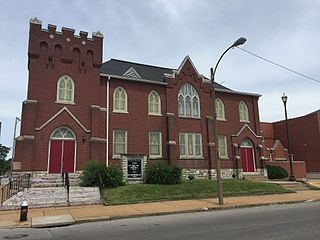
The Antioch Baptist Church in St. Louis, Missouri is a church long important in the black community of the Ville neighborhood of North St. Louis. It is located in a Gothic Revival-style brick building at 4213 N. Market St. which was built in 1921. The building was added to the National Register of Historic Places in 1999.

St. Paul's Catholic Church is a historic Roman Catholic church located in Portsmouth, Virginia, United States. It is a compact Gothic Revival style, cruciform plan church. It is constructed of load-bearing masonry walls clad in quarry-faced granite. The church was designed by John Peebles (1876-1934) in 1897, and dedicated in 1905. It is the fifth church on the site. Also on the property is a contributing rectory constructed in 1913.
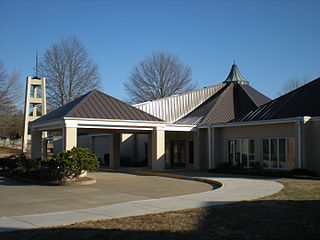
Hanover Lutheran Church is a Lutheran congregation in Cape Girardeau, Missouri, that is a member of the Lutheran Church–Missouri Synod. The congregation's original organization came about in 1846 as a result of the heavy German immigration to Missouri in the 19th century. The church's name, "Hanover", was chosen to reflect the place of origin of the majority of its members, since many of the Germans who had settled northwest of the town of Cape Girardeau had immigrated from the Kingdom of Hanover.
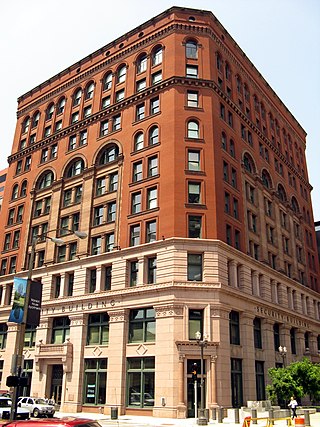
The Security Building is an 11-story building in Saint Louis, Missouri, built in 1892 in what was then the city's downtown financial district. Designed by Boston architects Peabody, Stearns & Furber, the building is of granite on the bottom two floors, with pink limestone and brick above. The building is on the National Register of Historic Places and designated an official landmark by the City of St. Louis.
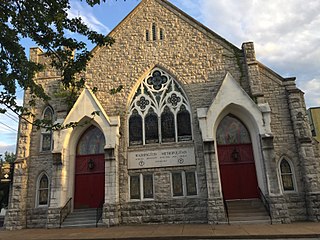
Washington Metropolitan African Methodist Episcopal Zion Church is a religious organization and historic church building in St. Louis, Missouri, U.S.. The building originally housed the United Methodist Episcopal Church. It is one of the few surviving examples of Gothic Revival churches in St. Louis. It has been listed as one of the National Register of Historic Places since 2005, for the architecture.





















